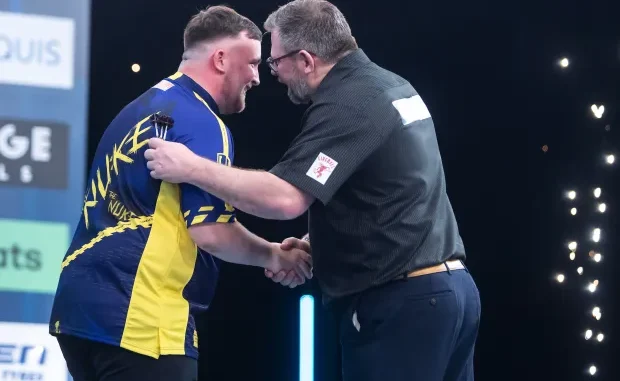
n the high-stakes world of professional darts, where precision and mental fortitude are paramount, the recent encounter between 18-year-old sensation Luke Littler and seasoned veteran James Wade at the World Masters has become a focal point of discussion.heir match not only showcased a significant shift in the sport’s dynamics but also ignited conversations about practice habits and the evolving nature of competition. A Dominant Performance
n a memorable evening at the Marshall Arena in Milton Keynes, Luke Littler delivered a performance that left the darts community in awe.acing James Wade, a player renowned for his consistency and finishing prowess, Littler achieved a commanding 4-0 victory, winning every leg without allowing Wade a single opportunity at a double.his whitewash was completed in just over 15 minutes, with Littler averaging an impressive 105.47 and maintaining a 50% success rate on his doubles. eflecting on his performance, Littler acknowledged the significance of his achievement, stating, “I knew I had to be at my best to beat James. He’s a class player, and to win in that manner is something special.”his victory secured Littler’s place in the quarter-finals, marking a notable milestone in his burgeoning career. The “Lazy” Label: A Surprising Admission
n the lead-up to their match, James Wade had expressed criticisms regarding the practice routines of some of his peers, labeling certain players as “lazy” behind closed doors.hile Luke Humphries, another rising star, refuted these claims, Littler offered a candid and unexpected response.e conceded, “He’s right… I am [lazy].”ittler elaborated that his natural talent allows him to succeed without extensive practice, a sentiment that has sparked considerable debate within the darts community. his admission provides a nuanced perspective on the preparation strategies of modern players.ittler’s acknowledgment challenges traditional notions of practice and discipline, suggesting that individual approaches can vary significantly based on personal strengths and playing styles. The Aftermath: Reactions and Reflections
ames Wade, known for his straightforward demeanor, had previously criticized both Littler and Humphries for their perceived lack of rigorous practice.ollowing his defeat, Wade was unable to attempt a single double, underscoring Littler’s dominance during the match.espite the loss, Wade’s earlier comments have prompted a broader discussion about the evolving nature of preparation in professional darts. ittler’s performance and subsequent admission have elicited a range of reactions from fans and analysts alike.ome commend his honesty and natural ability, while others express concern about the message it sends regarding work ethic in professional sports.his discourse highlights the balance between innate talent and dedicated practice, a topic that resonates across various competitive disciplines. A Journey Cut Short
espite his impressive victory over Wade, Littler’s journey in the World Masters was halted in the quarter-finals, where he faced world number seven, Jonny Clayton.n a closely contested match, Littler succumbed to a 4-2 defeat.eflecting on his exit, Littler remarked, “It’s disappointing to go out, but Jonny played exceptionally well. There’s always room for improvement, and I’ll take this experience forward.” layton’s subsequent progression to the final, where he faced world number one Luke Humphries, further emphasizes the high level of competition present at the tournament.umphries ultimately clinched the title with a narrow 6-5 victory, underscoring the fine margins that often define success in professional darts. The Broader Implications
ittler’s candid admission regarding his practice habits has ignited discussions about the diverse approaches to preparation in professional sports.hile traditional wisdom emphasizes the importance of rigorous practice, Littler’s success suggests that alternative methods, tailored to individual strengths, can also yield impressive results. his perspective invites a reevaluation of coaching and training methodologies, recognizing that a one-size-fits-all approach may not be applicable to all athletes.s sports science continues to evolve, understanding the interplay between natural talent, mental preparation, and physical practice becomes increasingly crucial. Looking Ahead
s Luke Littler continues his ascent in the world of professional darts, his journey will undoubtedly be closely monitored by fans and analysts alike.is recent performances have solidified his status as a formidable competitor, and his openness about his approach provides valuable insights into the diverse strategies employed by top athletes. or James Wade, this experience serves as a reminder of the ever-evolving landscape of professional darts, where emerging talents continually challenge established norms.he dynamic between seasoned veterans and rising stars enriches the sport, fostering a competitive environment that captivates audiences worldwide. n conclusion, the encounter between Luke Littler and James Wade at the World Masters transcends the confines of a single match.t encapsulates broader themes of talent, preparation, and the shifting paradigms within professional sports.s the debate continues, one thing remains certain: the world of darts is witnessing a new generation of players who are redefining the game’s boundaries. navlistLuke Littler’s Admission Sparks Debate in Darts Communityturn0news11,turn0news13,turn0news14
Leave a Reply